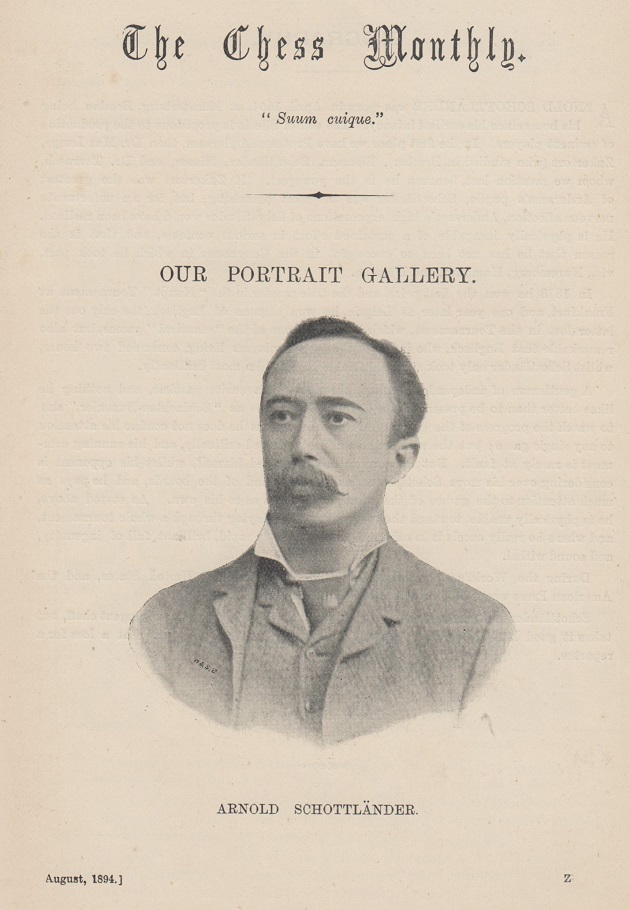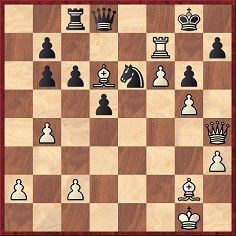
Edward Winter

Regarding Arnold Schottländer, see C.N. 11724.
a) From page 96 of The Fireside Book of Chess by Irving Chernev and Fred Reinfeld:
‘Schottlander needed only a draw to win first prize in the Leipzig tournament of 1888. Mieses offered him a draw in their last-round game, but he declined it! Schottlander lost the game, and with it first prize!’
b) From page 69 of Evans on Chess by Larry Evans:
‘In the Leipzig tournament of 1888, Schottlander refused Mieses’ offer of a draw, even though he would have clinched first prize by accepting. Schottlander eventually lost the game.’
c) From the crosstable given on page 14 of the January 1889 BCM: 1st-2nd, Bardeleben and Riemann with 5½ points; 3rd, Mieses with 4½; 4th, von Scheve with 4, followed by W. Paulsen and Schottländer, equal 5th with 2½.
(1466)
Page 379 of Gaige’s Chess Personalia gives the following details: Arnold Schottländer (note the umlaut), born on 2 April 1854 in Münsterberg and died on 9 September 1909 in Breslau.
Ken Whyld (Caistor, England) writes:
‘C.N. 1466 is curious. As you show in c), Schottländer would have needed to score 3½ points from a win against Mieses for a) and b) to have been true. Here is the game in question, from pages 42-43 of Deutsche Schachzeitung, February 1889. You will see that it was played on 5 December, viz. on about the third round. Further, it is inconceivable at any stage after the opening moves that Mieses would have regarded Schottländer’s game as worth a draw. Ironically, the annotator shows a surprising straw to clutch in the final position.’
Jacques Mieses – Arnold Schottländer
Leipzig, 5 December 1888
Vienna Game
1 e4 e5 2 Nc3 Bc5 3 g3 d6 4 Bg2 Nf6 5 Na4 Bb6 6 Nxb6 axb6 7 h3 Nc6 8 Ne2 O-O 9 O-O Ne8 10 d4 f5 11 f4 exd4 12 Nxd4 Nxd4 13 Qxd4 fxe4 14 Qxe4 Nf6 15 Qd3 Rb8 16 Bd2 Be6 17 g4 Nd7 18 Qg3 d5 19 f5 Bf7 20 g5 c6 21 Rae1 g6 22 f6 Re8 23 Bf4 Rc8 24 Qh4 Rxe1 25 Rxe1 Qf8 26 Re7 Nc5 27 b4 Ne6 28 Bd6 Qd8 29 Rxf7 Resigns.

The Deutsche Schachzeitung note in the final position reads:
‘Black seems to overlook that with 29...h5! he could hold out for a while. However, White could win two pawns with 30 Rxb7 Qxd6 31 Rxb6 or, alternatively, play 30 Re7 Qxd6 31 Qe1 Nf8 (if 31...Nxg5? 32 Re8+ Rxe8 33 Qxe8+ Kh7 34 Qe7+! and wins) 32 Rxb7; in both cases he would maintain a great advantage. The first to point out 29...h5! was R. Mangelsdorf.’
(Richard Mangelsdorf, born in Leipzig on 9 June 1823, died in Leipzig on 23 January 1894 – Chess Personalia.)
(1504)
Hans-Georg Kleinhenz (Munich, Germany) writes:
‘I should like to offer the likely solution to C.N.s 1466 and 1504. On page 189 of Dreihundert Schachpartien Tarrasch writes about the Leipzig, 1888 tournament:
“Riemann particularly distinguished himself in this tournament – at that time he was certainly the most dynamic German master – by the outstanding strength and elegance of his attacking play. He scored five wins, drew one game and lost one; the loss was because he refused to accept the draw offered to him by his opponent, Mieses, on account of the over-confidence instilled by his victory. A draw would, however, have assured him of first place.”
It seems most likely that later on there was a mix-up of names (Schottländer instead of Riemann) in an English-language source and that authors have subsequently just copied from each other.’
It should be noted that although Riemann did indeed lose to Mieses in the tournament, he still finished joint first.
Rob Verhoeven (The Hague, the Netherlands) sends a copy of page 9 of the January 1889 Deutsche Schachzeitung, which confirms that Riemann refused a draw against Mieses in his last game of the tournament. Our Dutch correspondent also quotes the game in question, which was published on pages 265-267 of the September 1889 Deutsche Schachzeitung. We follow the magazine’s punctuation:
Fritz Riemann – Jacques Mieses
Leipzig, 7 December 1888
Ruy López
1 e4 e5 2 Nf3 Nc6 3 Bb5 a6 4 Ba4 Nf6 5 Nc3 Be7 6 O-O d6 7 Bxc6+ bxc6 8 d4 exd4 9 Nxd4 Bb7 10 Nf5 Bf8 11 Re1 Nd7! 12 b3 g6 13 Nd4 Bg7 14 Bb2 O-O 15 Qd2 Re8 16 Rad1 Nf8 17 Nf3 Ne6 18 Na4 c5 19 Bxg7 Nxg7 20 Qh6 Ne6 21 Nc3 Qf6 22 Nd5 Bxd5 23 exd5 Nf4 24 c4 Nh5 25 Re3 Qg7 26 Qxg7+ Nxg7 27 Rde1 Rxe3 28 Rxe3 Re8 29 Rxe8+ Nxe8 30 Kf1 Nf6 31 Nd2 Kf8 32 Ke2 Ke7 33 Ke3 Kd7 34 Kf4 h6 35 g4 Ke7 36 h4 Nd7 37 f3 Ne5 38 Ke4 Kd7 39 Nb1 Ke7 40 Nc3 Kd7 41 Ne2 Ke7 42 Ng3 Kd7 43 h5 Ke7 44 hxg6 fxg6 45 Ne2 Kf6 46 Nf4 Nf7! 47 Ke3 Ng5 48 Kf2 Kf7 49 Kg3 Kf6 50 Ne2 Nf7 51 f4 g5 52 Nc3 gxf4+ 53 Kxf4 Ng5 54 Ne2 Nh3+ 55 Kg3 Ng5 56 Nf4 Ke5 57 a3? Ne4+ 58 Kf3 Nd2+ 59 Ke3 Nxb3 60 Ne6 Na5 61 Kd3 c6 62 Nc7 cxd5 63 Nxd5 Nc6 64 Nc7 a5 65 Nd5 Nd4 66 a4 Nc6 67 Ke3 Nb4 68 Ne7 d5 69 Ng8 dxc4 70 Nxh6 c3 71 g5 c4 72 Nf7+ Kd5 73 g6 c2 74 Kd2 c3+ 75 Kc1 Kc4! 76 White resigns.
From Jeremy Gaige’s Chess Personalia: Fritz Riemann: born on 2 January 1859 in Niederweistritz, died on 22 November 1932 in Erfurt.
(1523)
To the Chess Notes main page.
To the Archives for other feature articles.
Copyright: Edward Winter. All rights reserved.